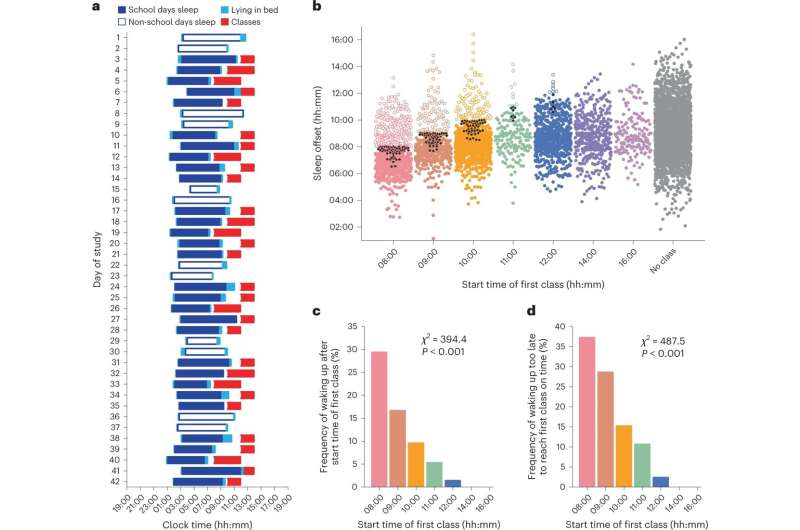February 22, 2023 report
This article has been reviewed according to Science X's editorial process and policies. Editors have highlighted the following attributes while ensuring the content's credibility:
fact-checked
peer-reviewed publication
trusted source
proofread
Early rise times found to lead to lower grades, poorer attendance

Early class start times are associated with lower grades and poorer attendance, according to a study tracking attendance and grades of university students.
While grades for classes held in the morning were not significantly lower than those held in the afternoon, morning classes showed a cumulative negative impact on student performance throughout the day. Academic outcomes only got worse the more morning classes a student had scheduled. Researchers found a clear signal that grade point averages were highest for students with no morning classes.
Published in the journal Nature Human Behaviour, the study, "Early morning university classes are associated with impaired sleep and academic performance," found correlations between sleep, class schedule, and academic performance through a robust collection of data.
Student attendance was passively tracked via WiFi connection logs of 53 class sessions across 13 different courses. 17.4 million time-stamped logins of 39,458 students with the university's Learning Management System (LMS) were collected. The researchers also used a smaller subset of 181 students that participated in a sleep study with 7,329 recordings of device interactions.
By combining the students' Wi-Fi connection logs with their course timetables, researchers at the National University of Singapore were able to estimate the class attendance of more than 23,000 students without requiring their active participation. Data showed that attendance was lowest for classes that started at 8 a.m., about 10 percentage points lower than classes with later start times.
Logins to the university LMS showed a shorter inactive period for students with early start times when compared to those with later start times. The logins illustrated that while students went to bed around the same time, they were waking up earlier to attend morning classes resulting in less potential time for sleep.
The sleep study students were found to get an hour less sleep on days with early morning classes and did not wake up early enough to be on time for nearly one-third of 8 a.m. classes. In reviewing the grades of 33,818 students, researchers showed that the number of days per week a student had morning classes negatively correlated with their grade point average.
Based on the findings, the researchers suggest universities should consider avoiding mandatory early morning classes. While offering early classes may maximize the use of campus classroom space and faculty time spent on teaching, their results indicate that student performance could suffer.
They also point out that most universities currently have the ability to assess their own class start time vs. attendance trends. Since most students carry Wi-Fi-enabled devices, connection data could be used to estimate class attendance without students or instructors needing to take part in an active study.
More information: Sing Chen Yeo et al, Early morning university classes are associated with impaired sleep and academic performance, Nature Human Behaviour (2023). DOI: 10.1038/s41562-023-01531-x
Journal information: Nature Human Behaviour
© 2023 Science X Network





















